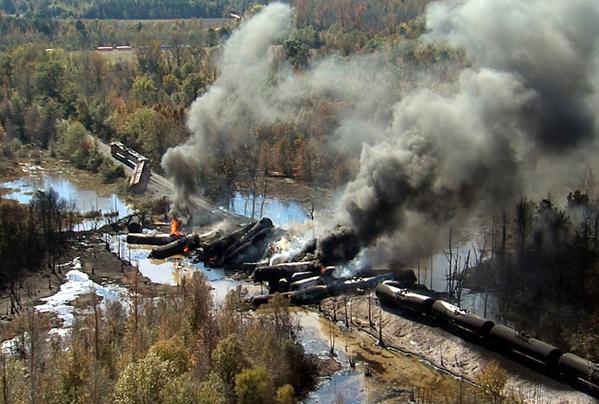Some Things You May Have Missed This Week
The Administration didn’t take the week off from undermining efforts to protect the environment.
As many of us were, I w as riveted for much of the past several days by the news and hearings regarding Judge Kavanaugh’s potential appointment to the United States Supreme Court. It’s easy to feel these days as though any one aspect of what’s happening politically at any given moment could occupy all of our time and attention, and this week was no exception. But in case you missed it, this week there were a couple of significant developments on the environmental protection front unrelated to Kavanaugh’s nomination.
as riveted for much of the past several days by the news and hearings regarding Judge Kavanaugh’s potential appointment to the United States Supreme Court. It’s easy to feel these days as though any one aspect of what’s happening politically at any given moment could occupy all of our time and attention, and this week was no exception. But in case you missed it, this week there were a couple of significant developments on the environmental protection front unrelated to Kavanaugh’s nomination.
PHMSA Rollback of Train Safety Regulations for Transportation of Hazardous Materials
On Tuesday, the Pipeline and Hazardous Materials Safety Administration (PHMSA) issued a final rule rolling back Obama-era regulations that imposed important brake systems controls on trains that carry hazardous and highly flammable materials, including crude oil. Specifically, all tank cars on high-hazard flammable trains and high-hazard flammable unit trains operating under certain conditions were required to be equipped with electronically controlled pneumatic (ECP) brakes, which are shown to reduce the number of tank cars involved in derailments.
Tuesday’s final rule acknowledges that the Obama-era regulations were “an integral part of [Department of Transportation’s] comprehensive approach to ensuring the safe transportation of energy products by rail” and that many provisions of those regulations, including the advanced brake systems requirements, “were the culmination of industry-led efforts to improve tank car safety in anticipation of increased crude oil shipments by rail.” Nonetheless, Trump’s PHMSA is eliminating the ECP brake requirements, asserting that they “are not expected to be cost-beneficial under any scenario assessed.” To arrive at this conclusion, PHMSA reduced its projected assessment of the amount of crude oil that would be delivered by rail and concluded that the Obama-era regulations were not economically justified.
The repeal of the ECP brake requirements is just the most recent example of a trend we continue to see with Trump Administration rollbacks: a disregard for human and environmental safety costs in favor of cost savings to industry—even when industry participated in and agreed to the earlier regulatory approach. The new regulations are likely to be met with legal challenges: Washington Governor Jay Inslee issued a statement on Tuesday calling the action “incomprehensible” and “a reckless disregard for the life and property of all who live or work along the rail tracks that transport volatile Bakken crude oil.” He has pledged to “continue to lean on our federal partners to do the right thing and put the safety of our communities over the profits of the oil industry.”
Shake-Ups at EPA
Two separate developments at EPA this week highlight the Administration’s pattern of disregard for sensitive communities and science-based regulation. Late on Tuesday, EPA placed the head of its Office of Children’s Health Protection on administrative leave without explanation. Only a day later, news outlets, including the New York Times, reported that EPA will dissolve its Office of the Science Advisor, a program designed to provide “leadership on science and technology issues and policy to facilitate the integration of the highest quality science into the Agency’s policies and decisions.”
The dismissal of Dr. Ruth Etzel, who has headed the Office of Children’s Health Protection, comes as some within her department describe months of delay and pushback on the office’s work, including its development of a strategy for reducing childhood lead exposure. Because children are especially sensitive to environmental harms, the office has often advocated for more stringent regulatory standards; most recently, the office refused to concur with an EPA plan to weaken chemical safety standards prohibiting farm workers under the age of 18 from applying toxic pesticides to produce. Some have suggested that Dr. Etzel’s leave may result in the elimination of the office entirely.
We’ve written here before about the Trump Administration’s efforts to undermine the use of reliable peer-reviewed science in regulatory decision-making; the dissolution of the Office of the Science Advisor is only the latest development in that trend. Historically, the Office of the Science Advisor has reported directly to the EPA Administrator, offering counsel on the integration of the best science into EPA decision-making processes. In addition, the Science Advisor has overseen a number of programs and projects to promote the use of the best scientific information in regulation, including the Science and Technology Policy Council and the implementation of EPA’s Scientific Integrity policy. Once the Office of the Science Advisor has been dissolved, EPA will reportedly merge the Science Advisor position into an office that reports to the EPA’s Deputy Assistant Administrator for Science, a significant demotion of the role.
With so much happening, it’s hard to keep track of every assault on environmental regulations and the agencies charged with promoting them. But the developments of this week are a reminder that important protections are consistently being chipped away at the expense of human and environmental health, even as other headlines distract us.
Reader Comments
2 Replies to “Some Things You May Have Missed This Week”
Comments are closed.







Julia said;
“………it’s hard to keep track of every assault on environmental regulations…..”
Dear Julia,
Please be very careful when using the term “assault” because it is a serious accusation that should not be lightly tossed about. Whenever such an accusation is made there should be corroborating evidence and witnesses in order to properly validate both accuracy and legitimacy. We are now witnessing the tragic consequences that have resulted from spurious and false accusations delivered with malice, enmity and rancor. So please be very careful when using the term “assault.”
BQRQ – please use the word “false accusations’ more carefully, especially when you don’t know what you’re talking about. Thanks!